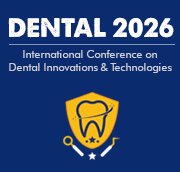Title : Sirtuin6 activation ameliorates ligature-induced periodontitis in mice
Abstract:
Purpose: Periodontitis is an inflammatory disease caused by microorganisms that induce the destruction of periodontal tissue. Inflamed and damaged tissues produce various inflammatory cytokines. These cytokines activate osteoclast and finally induce loss of alveolar bone. However, molecular mechanisms involved in the rapid breakdown of periodontal tissue have not been elucidated yet. Sirtuins are known to exert an anti-inflammatory function and anti-bone resorption. We hypothesized that sirtuins have a protective role in periodontitis.
Methods: To understand the role of sirtuins in periodontitis, we developed periodontitis with ligature placement around maxillary left second molar in 8-week-old C57BL/6J male mice. Since the protein level of sirtuin6 (Sirt6) in alveolar bone lesion showed the most change among sirtuins, we performed that surgery on Sirt6 overexpressed Tg mice (Sirt6Tg) and checked phenotypes using microCT. Furthermore, the Sirt6 activator, MDL800, was used for therapeutic application in periodontitis through oral gavage.
Results: Pro-inflammatory cytokines and increasing osteoclast numbers were observed in alveolar bone tissue under periodontitis surgery. In the same condition, interestingly, the protein level of Sirt6 was the most reduced among sirtuins in alveolar bone tissue. As a result of micro-CT and CEJ-ABC distance, Sirt6Tg was observed to resist bone loss against ligature-induced periodontitis. Furthermore, the number of osteoclasts was significantly reduced in Sirt6Tg ligated mice compared to control ligated mice, although systemic inflammatory cytokines were not changed. To confirm the clinical significance, it was observed that bone loss was significantly reduced when the Sirt6 activator, MDL800, was treated in ligated mice.
Conclusion: Our findings demonstrate that Sirt6 activation prevents bone loss against ligature-induced periodontitis. Activation of Sirt6 may provide a new therapeutic approach to periodontitis.



